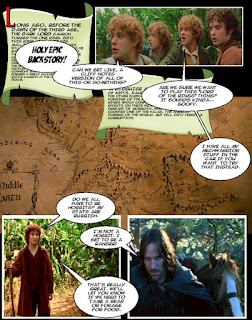Re-blog: A great article on worldbuilding
Today, I stumbled on the excellent Tales of the Grotesque and Dungeonesque blog and found this article that any aspiring setting brewer should read:
World-Building: When is Enough Too Much?
It really spells out and crystalises some of my own thoughts on why 'Brevity is king'
In particular this passage:
And perhaps also, though I am still debating with myself if it is overkill, a few notes on ancient history that I plan to seed future scenarios and dungeon crawls with.
This sort of exposition is what turned me off Troll Lord's Codex of Aihrde, which starts heavy with snowflake exposition concerning the dawn of history. The philosophy that went into the design of the setting is a virtual antithesis to the simple design of Castle & Crusades it was designed for. On the other end of the scale, though I admire Gygax's ability to build the bones of a world history in just four pages of the original World of Greyhawk boxed set, it is perhaps just a little too sparse. Good enough though.
Besides readability, the other advantage of refraining from this level of detail is flexibility and mystery - Which allows you to dump in any kind of ancient history on the spot when you need to. Maybe it turns out to be the very history you so meticulously jotted down in a flurry of enthused inspiration and if so, that's great. But it is also nice to have a setting mysterious enough to yourself as creator that you can dump in the ancient history of whatever module you may be using with little difficulty because you havent
World-Building: When is Enough Too Much?
It really spells out and crystalises some of my own thoughts on why 'Brevity is king'
In particular this passage:
(B) A lot of world-builders are kidding themselves about the uniqueness of the history they've written for their settings. If it fits into the familiar pattern of “In the Age of Fire, the dragons rose and gathered these followers, but were eventually beaten back by the Knights of Gorro, led by the Great King Fajadhul who founded the city of Dahan in the Year 100030” you should realize that the words and dates could be swapped out to create the back story of a million other nondescript fantasy settings. This is sub-Tolkienism.Struck home with me. I have been brutally guilty of this in the past, and still am to a certain extent, though I am trying to condense it only to past events that still have a meaningful impact for the present (ie, in the minds of the people inhabiting the setting, not in the mind of the DM who knows all the secret history and causation of the world) or somehow define the nature of the setting itself.
And perhaps also, though I am still debating with myself if it is overkill, a few notes on ancient history that I plan to seed future scenarios and dungeon crawls with.
 |
| Epic Backstory at its best |
This sort of exposition is what turned me off Troll Lord's Codex of Aihrde, which starts heavy with snowflake exposition concerning the dawn of history. The philosophy that went into the design of the setting is a virtual antithesis to the simple design of Castle & Crusades it was designed for. On the other end of the scale, though I admire Gygax's ability to build the bones of a world history in just four pages of the original World of Greyhawk boxed set, it is perhaps just a little too sparse. Good enough though.
Besides readability, the other advantage of refraining from this level of detail is flexibility and mystery - Which allows you to dump in any kind of ancient history on the spot when you need to. Maybe it turns out to be the very history you so meticulously jotted down in a flurry of enthused inspiration and if so, that's great. But it is also nice to have a setting mysterious enough to yourself as creator that you can dump in the ancient history of whatever module you may be using with little difficulty because you havent






Comments
Post a Comment